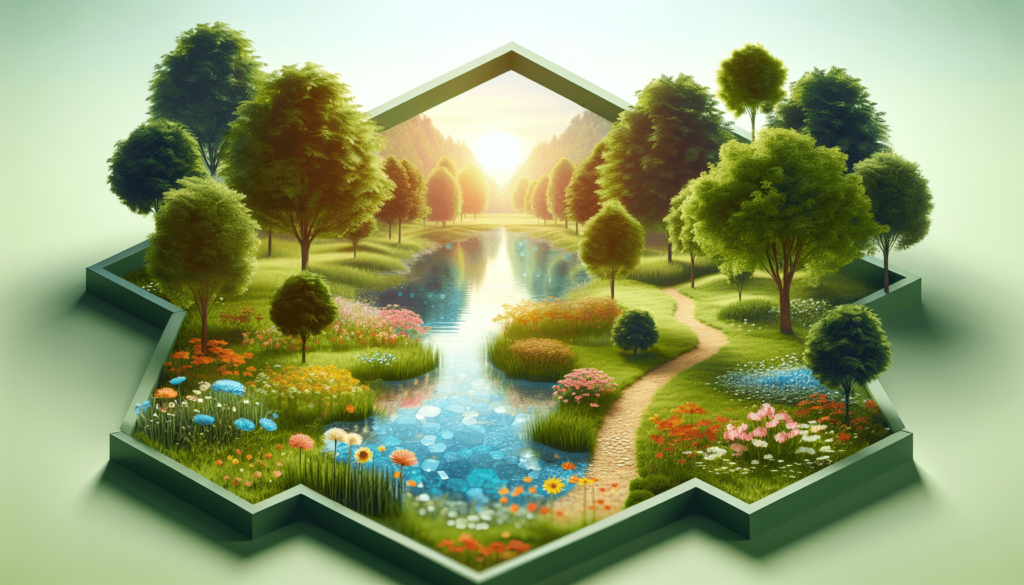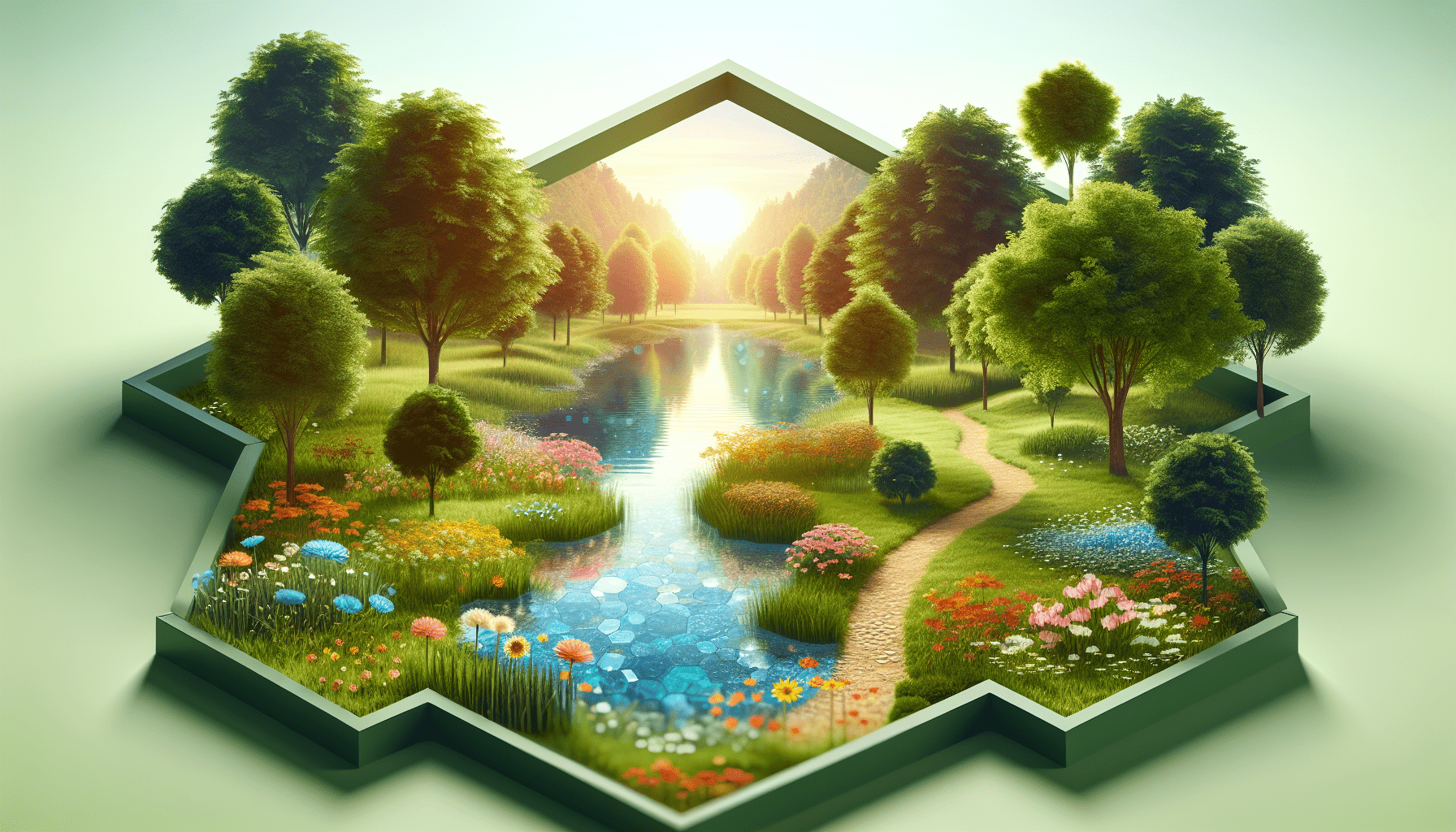Imagine stepping outside into a lush green park, surrounded by tall trees and vibrant flowers. Feel the warm sun on your skin and the gentle breeze tickling your face. In this tranquil oasis, you take a deep breath, feeling a sense of calm wash over you. It’s not just your imagination – studies have shown that green spaces play a crucial role in promoting mental well-being. From reducing stress and anxiety to boosting mood and enhancing cognitive function, the positive impact of green spaces on mental health cannot be understated. In this article, we will explore the various ways in which nature’s embrace can benefit our minds and nurture our souls.
Improving Overall Mental Well-being
Green spaces play a crucial role in improving overall mental well-being. By providing a sanctuary away from the hustle and bustle of daily life, these spaces offer a respite for individuals to unwind and rejuvenate. Engaging with green spaces, whether through physical activities or simply immersing oneself in nature, has been proven to have both physical and psychological benefits.
Physical and Psychological Benefits
Regular exposure to green spaces has been linked to numerous physical and psychological benefits. Studies have shown that spending time in nature can lower blood pressure, reduce heart rate, and improve overall cardiovascular health. Additionally, green spaces encourage individuals to engage in physical activities such as walking, jogging, or cycling, promoting fitness and overall well-being.
From a psychological perspective, spending time in green spaces has been proven to reduce stress and anxiety. The calming effect of nature has a soothing impact on the mind, helping individuals relax and unwind. This natural environment creates a sense of tranquility and harmony, allowing individuals to escape from the pressures of daily life.
Reducing Stress and Anxiety
The demands of modern life can often lead to high levels of stress and anxiety. However, spending time in green spaces has the power to alleviate these negative emotions. The sights, sounds, and smells of nature have a calming effect on the brain, triggering a relaxation response. Whether it’s a serene park or a lush forest, immersing oneself in green spaces provides an opportunity to take a break from the stressors of life and find solace in the beauty of nature.
Research has shown that spending time in nature can reduce levels of stress hormones in the body, such as cortisol. This decrease in stress hormones helps regulate blood pressure, heart rate, and overall mental well-being. Furthermore, the presence of greenery has been proven to enhance mood and happiness, leading to an improved quality of life.
Enhancing Mood and Happiness
Green spaces have a profound impact on mood and happiness. The vibrant colors, fresh air, and natural beauty found in these environments have a positive influence on one’s mental state. Studies have shown that spending time in green spaces can increase feelings of happiness, satisfaction, and overall well-being.
The exposure to natural sunlight in green spaces also plays a role in enhancing mood. Sunlight triggers the release of serotonin, a neurotransmitter known as the “happy hormone,” which improves mood and promotes a sense of well-being. Additionally, the physical activity often associated with green spaces releases endorphins, the body’s natural feel-good chemicals, further contributing to an enhanced mood and overall happiness.
Promoting Physical Activity
Green spaces serve as a catalyst for promoting physical activity, encouraging individuals to engage in outdoor exercise and ultimately improve their fitness levels. The availability of open spaces, trails, and recreational facilities within these areas creates an ideal setting for individuals to partake in various physical activities.
Encouraging Outdoor Exercise
Green spaces provide the ideal backdrop for outdoor exercise. Whether it be jogging, cycling, or practicing yoga, green spaces offer a refreshing change from indoor environments. The presence of nature and the invigorating fresh air make exercising in green spaces a pleasurable and rewarding experience.
Outdoor exercise not only challenges the body physically but also uplifts the spirit. Being surrounded by greenery and natural elements while working out can boost motivation and enhance the overall exercise experience. Furthermore, outdoor exercise provides an opportunity for individuals to connect with their environment, contributing to a sense of well-being and a stronger mind-body connection.
Increasing Fitness Levels
Regular physical activity is essential for maintaining good health and improving fitness levels. Green spaces offer a variety of opportunities to engage in exercise, which in turn helps individuals improve their fitness. Walking or cycling paths, sports fields, and fitness equipment found in parks and recreation areas provide individuals with the means to engage in both cardiovascular and strength-building exercises.
When individuals engage in regular physical activity in green spaces, they are likely to experience improvements in their endurance, strength, and flexibility. The presence of nature can serve as a motivating factor, encouraging individuals to push themselves further and achieve their fitness goals. By promoting physical activity, green spaces contribute to an overall healthier lifestyle and improved well-being.

Strengthening Social Connections
In addition to improving physical health, green spaces also play a pivotal role in strengthening social connections. These spaces provide a platform for individuals to interact with others, fostering a sense of belonging and promoting community cohesion.
Facilitating Social Interactions
Green spaces act as a meeting point for individuals from diverse backgrounds and interests. Whether it’s a community gathering, a picnic with friends, or a sports event, these spaces bring people together, fostering social interactions and creating opportunities for meaningful connections. The relaxed and natural atmosphere of green spaces encourages conversations and bonding, allowing individuals to form friendships and networks that can positively impact their mental and emotional well-being.
The shared experience of enjoying nature and engaging in recreational activities in green spaces often leads to the development of common interests and shared goals. This shared sense of purpose further strengthens social connections and encourages individuals to support and motivate one another in achieving their personal and social objectives.
Promoting Community Cohesion
Green spaces serve as a gathering point for communities, bringing together individuals from different walks of life. The presence of shared recreational facilities, such as playgrounds, sports fields, and picnic areas, provides opportunities for community members to engage in collective activities. These shared experiences foster a sense of unity, pride, and belonging among residents, ultimately promoting community cohesion.
By encouraging individuals to come together and participate in community events, green spaces facilitate the development of social ties and create a sense of connectedness. This interconnectedness in turn contributes to a stronger and more resilient community, where individuals feel supported and valued, enhancing their overall mental well-being.
Providing a Sense of Belonging and Identity
Green spaces offer individuals a sense of belonging and identity, as they provide a unique opportunity to establish a connection with nature, fostering personal growth and reflection.
Creating a Connection with Nature
Humans have an innate connection with the natural world, and green spaces provide a platform for individuals to establish or strengthen this connection. Whether it’s walking through a forest, tending to a garden, or simply enjoying the serenity of a park, green spaces offer a space for individuals to reconnect with the natural environment.
The experience of immersing oneself in nature can evoke feelings of awe, wonder, and connectedness. This connection with nature has been associated with increased feelings of happiness, inner peace, and a sense of purpose. By fostering a deeper connection with the natural world, green spaces provide individuals with a sense of belonging and identity, contributing to their overall mental well-being.
Fostering Personal Growth and Reflection
Green spaces provide a tranquil environment where individuals can engage in self-reflection and personal growth. The peacefulness and serenity of these spaces offer a respite from the noise and distractions of daily life, allowing individuals to introspect and gain clarity.
Engaging in activities such as walking, meditating, or journaling in green spaces can facilitate self-discovery and personal growth. The solitude and beauty of nature provide a conducive environment for reflection, enabling individuals to gain insights into their thoughts, emotions, and aspirations. This process of self-reflection and personal growth contributes to improved self-awareness, increased resilience, and a stronger sense of well-being.

Enhancing Cognitive Functioning
Green spaces have a significant impact on cognitive functioning, positively influencing attention, concentration, memory, and learning abilities.
Improving Attention and Concentration
Studies have demonstrated that exposure to natural environments, including green spaces, can improve attention and concentration. The calming effects of nature help reduce mental fatigue and restore cognitive resources, enhancing one’s ability to focus and concentrate on tasks.
Green spaces offer a break from the constant stimulation and visual overload often associated with urban environments. The presence of natural elements, such as trees, flowers, and water features, provides a visually appealing setting that promotes mental clarity and attentiveness. Engaging with green spaces allows individuals to recharge their cognitive capacities, leading to improved productivity and overall cognitive functioning.
Boosting Memory and Learning
The presence of green spaces has also been linked to improved memory and learning abilities. Spending time in nature stimulates the brain in ways that support memory consolidation and information retention. The restorative effects of green spaces contribute to a calmer and more focused state of mind, which is conducive to effective learning and memory formation.
Research has shown that individuals who spend time in green spaces exhibit better cognitive performance, including improved attention, memory recall, and problem-solving skills. The exposure to natural stimuli, such as the textures, scents, and sounds of nature, activates the brain’s neural pathways associated with memory and learning, leading to enhanced cognitive functioning.
Reducing Symptoms of Mental Disorders
Green spaces have the potential to alleviate symptoms associated with mental disorders such as depression, anxiety, and attention deficit hyperactivity disorder (ADHD). The therapeutic effects of nature create an environment that promotes mental well-being and offers support for individuals facing these challenges.
Alleviating Depression and Anxiety
Green spaces offer a natural remedy for alleviating symptoms of depression and anxiety. The presence of natural elements has been shown to have a positive impact on mood, reducing feelings of sadness, hopelessness, and anxiety.
Spending time in green spaces triggers the release of endorphins, which enhance mood and promote a sense of well-being. The calming effect of nature also helps regulate stress hormones, such as cortisol, which can be elevated in individuals with depression and anxiety. Moreover, green spaces provide an opportunity for individuals to engage in physical activities, which have been proven to be effective in reducing symptoms of these mental disorders.
Mitigating ADHD Symptoms
Green spaces have also been found to be beneficial in mitigating symptoms of attention deficit hyperactivity disorder (ADHD). The natural environment found in green spaces provides a soothing and engaging setting that helps individuals with ADHD improve their attention and concentration.
Exposure to nature stimulates the brain’s attentional capacity and reduces symptoms of mental fatigue associated with ADHD. The natural elements in green spaces, such as trees, water, and wildlife, provide a multisensory experience that captivates the attention and promotes mental focus. Moreover, green spaces offer opportunities for physical activities, which can help individuals with ADHD channel their excess energy and improve their overall well-being.
Offering a Therapeutic Environment
Green spaces provide a therapeutic environment that supports mental well-being and offers a platform for activities such as mindfulness and meditation.
Restorative Effects on Mental Fatigue
The natural environment found in green spaces has a restorative effect on mental fatigue. In today’s fast-paced world, mental exhaustion and burnout are common, and green spaces provide the necessary respite to recharge and rejuvenate.
Engaging with green spaces helps individuals recover from mental fatigue by diverting their attention from mentally draining tasks and offering a peaceful setting to unwind. The sights, sounds, and smells of nature induce a sense of tranquility, allowing individuals to experience a state of calm and mental restoration. The therapeutic effects of green spaces contribute to improved mental well-being and overall happiness.
Supporting Mindfulness and Meditation
Green spaces offer an ideal setting for practicing mindfulness and meditation. The peacefulness and serenity of these environments create a conducive atmosphere for individuals to cultivate present-moment awareness and engage in deep relaxation.
Engaging in mindfulness and meditation practices in green spaces allows individuals to fully immerse themselves in the natural environment, enhancing the benefits of these practices. Observing the beauty of nature, listening to the sounds of birds chirping, and feeling the gentle breeze on one’s skin all contribute to a heightened state of mindfulness and a deeper sense of connection with the present moment. Green spaces provide individuals with a space to recharge, find inner peace, and strengthen their overall mental well-being.
Improving Sleep Quality
Green spaces have a positive impact on sleep quality, helping individuals reduce insomnia and sleep disorders. The calming and relaxing atmosphere found in these environments creates an optimal setting for a restful night’s sleep.
Reducing Insomnia and Sleep Disorders
Insomnia and sleep disorders are common issues that can significantly impact one’s mental and physical well-being. However, spending time in green spaces can help mitigate these sleep-related problems. The exposure to natural environments has been shown to regulate sleep-wake cycles and improve overall sleep quality.
The natural elements found in green spaces, such as fresh air, natural sounds, and the absence of artificial light, contribute to a more conducive sleep environment. Engaging with green spaces during the day helps regulate the body’s circadian rhythms, promoting a more regular sleep pattern. Additionally, the physical activity associated with green spaces helps tire the body, making it easier to fall asleep and stay asleep throughout the night.
Creating a Calming and Relaxing Atmosphere
Green spaces provide a calming and relaxing atmosphere that contributes to improved sleep quality. The absence of noise pollution and the presence of natural elements have a soothing effect on the mind and promote a sense of serenity. This peaceful environment cultivates a relaxed state of mind, preparing individuals for a restful night’s sleep.
Furthermore, spending time in green spaces helps reduce anxiety and stress, which are common factors that contribute to disrupted sleep. The immersion in nature stimulates a sense of tranquility, allowing individuals to let go of worries and tensions accumulated throughout the day. By creating a calming and relaxing atmosphere, green spaces support healthy sleep patterns and overall mental well-being.
Reducing Substance Abuse and Addiction
Green spaces have been found to play a role in reducing substance abuse and addiction by providing a detoxifying environment and offering alternative coping mechanisms.
Detoxifying Environment
Green spaces act as a detoxifying environment, offering individuals an escape from toxic environments that may contribute to substance abuse and addiction. The presence of nature serves as a counterbalance to the stresses and triggers that lead to addictive behaviors.
Engaging with green spaces allows individuals to distance themselves from negative influences and temptations, providing a respite for recovery. The therapeutic effects of green spaces, including reduced stress and enhanced well-being, contribute to a healthier mindset and support individuals in their journey towards substance-free lifestyles.
Offering Alternative Coping Mechanisms
Green spaces offer a range of alternative coping mechanisms for individuals struggling with substance abuse and addiction. Engaging in physical activities, such as hiking, gardening, or group sports, provides a healthy outlet for stress and anxiety, allowing individuals to manage their emotions without resorting to substance use.
The connection with nature found in green spaces can also serve as a positive distraction from cravings or triggers associated with substance abuse and addiction. Immersing oneself in the beauty of nature and engaging with natural elements helps individuals find solace and comfort, offering a healthier outlet for emotional regulation.
By promoting healthy coping strategies and providing a supportive environment, green spaces contribute to reducing substance abuse and addiction, leading to improved mental and physical well-being.
Increasing Resilience and Stress Coping Abilities
Green spaces play a vital role in increasing resilience and enhancing stress coping abilities. The natural environment found in these spaces provides individuals with a buffer against life stressors and offers opportunities to develop effective coping strategies.
Providing a Buffer Against Life Stressors
Everyday life is filled with various stressors, such as work pressures, financial worries, and relationship challenges. Green spaces act as a buffer against these stressors by offering a sanctuary where individuals can find solace and relief.
Engaging with green spaces provides individuals with a mental and emotional escape from the demands of daily life. The presence of nature helps individuals foster a sense of perspective, reminding them of the broader natural world and their place within it. This broader perspective decreases the intensity of stressors and helps individuals develop a resilient mindset, enabling them to effectively navigate challenges and maintain mental well-being.
Enhancing Coping Strategies
Green spaces offer a range of opportunities for individuals to develop and enhance their coping strategies. Outdoor activities, such as walking, hiking, or gardening, provide individuals with a healthy outlet for stress and anxiety, promoting emotional regulation and resilience.
Engaging with natural environments also encourages individuals to practice mindfulness and relaxation techniques, which are effective coping strategies for managing stress. The calm and serene atmosphere of green spaces supports the development of these techniques, allowing individuals to cultivate a greater sense of peace and inner strength.
By providing a supportive environment and opportunities for growth, green spaces enhance individuals’ ability to cope with stress, increasing their resilience and overall mental well-being.
In conclusion, green spaces have a profound impact on mental well-being in various ways. From improving overall mental well-being to promoting physical activity, strengthening social connections, enhancing cognitive functioning, and reducing symptoms of mental disorders, green spaces offer a range of benefits for individuals seeking to enhance their mental health. By providing a therapeutic environment, improving sleep quality, reducing substance abuse, and increasing resilience, green spaces serve as a valuable resource for individuals striving for optimal mental well-being. So, embrace the power of green spaces, immerse yourself in nature’s beauty, and experience the profound positive impact it can have on your mental health.

